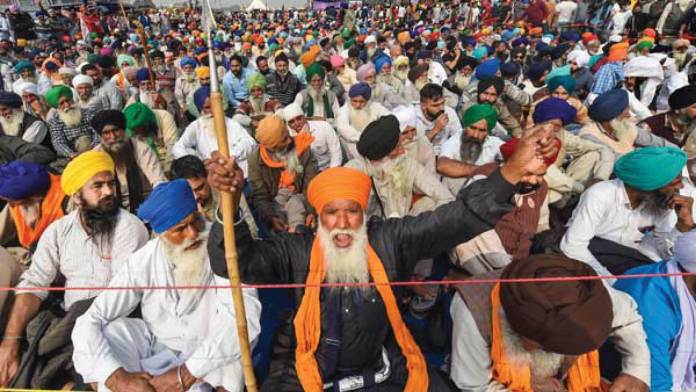NEW DELHI
Tens of thousands of Indian farmers camping on the outskirts of the capital city, New Delhi, for more than a week have launched a “Bharat Bandh” (nationwide general strike) to demand the scrapping of three farm laws they say will hurt their livelihood and benefit only corporations.
Railway tracks and highways were blocked across India as farmers launched a national day of action against reforms deregulating the agriculture sector, upping the stakes after 10 days blockading the capital.
Farmer leaders say the laws are pro-corporate and will gradually lead to the government withdrawing the current guaranteed price mechanism under which it buys agricultural produce from farmers.
Prime Minister Narendra Modi has defended the three laws passed in September, saying they will boost private investment in the moribund agriculture sector and boost farm income.
Thousands of farmers, mostly from the “grain bowl of India” in the northern states of Haryana and Punjab, have blocked three key highways linking Delhi to neighbouring states and refuse to move until the government accepts their demands.
It is not just Punjab and Haryana that have farmers unhappy with these laws. “Protest against the farm laws are going in every state,” Hannan Mollah, a Communist Party of India (Marxist) leader and general secretary of the All India Kisan Sabha, told the media.
Farmer associations and trade unions from other regions have joined the agitation and opposition parties declared their support for one of the biggest protests in decades.
“As many as 475 unions of farmers from all the states and union territories have supported the call for the Bharat Bandh,” said Darshan Pal, a farmer leader who has participated in talks with the government. “We have given this call for shutdown to put more pressure on the government and we the farmers’ organisations are hopeful that the government will accept our demands and revoke the laws.”
Authorities have deployed thousands of additional police in Delhi and boosted security in the rest of the country as protesters pledged to block roads and rail lines across the country.
Five rounds of talks between the government and representatives of the farmers have failed to break the deadlock as farmers refuse to accept anything less than the scrapping of the three laws and assurances of a guaranteed minimum support price for their produce.
The government has so far stood its ground, saying the new laws will “liberate” farmers from the tyranny of middlemen.
Nalin Kohli, spokesman for the governing Bharatiya Janata Party (BJP), believes talks will resolve the biggest crisis facing Modi. “Senior ministers from the government have been meeting representatives and leaders to allay their fears and find a solution,” he said.
However, Sansar Singh, a farmer from Punjab, said: “We don’t want any discussion on the amendment of the three laws, we are here simply to convey to Narendra Modi to revoke the laws. There is no politics in it, we feel the laws are going to benefit corporations and not poor farmers like us.”
India’s agriculture sector, which employs more than half of India’s 1.4 billion people, has been facing a crisis, driving thousands of debt-ridden farmers to take their own lives.
The protesters have other demands, one being that the government stop fining farmers for clearing their fields by burning the stubble left behind by their wheat crops – considered the main source of air pollution in Delhi during the winter months – arguing that the government should subsidise the clearing of fields or stop fining the burning. They also want the withdrawal of this year’s electricity bill, which they fear will push power bills higher.

